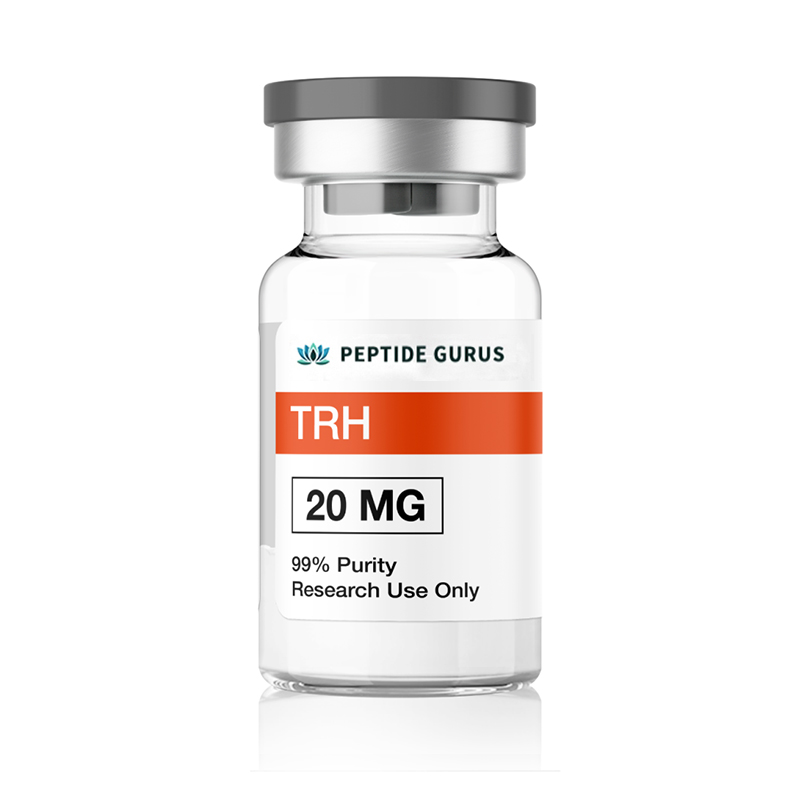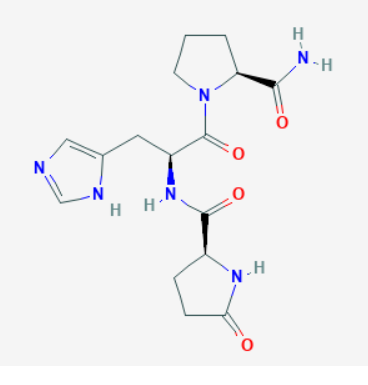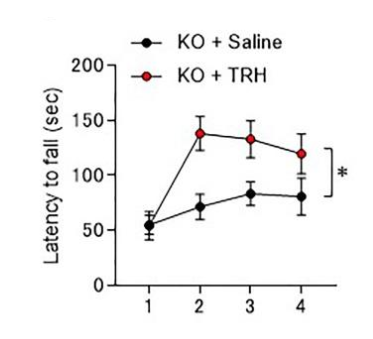



Categories: Peptide Finished product, Peptides and Their Dosages
Free (1) 30 ml Bacteriostatic Water
with qualified orders over $500 USD.
(excludes capsule products, cosmetic peptides, promo codes and shipping)
Thyrotropin releasing hormone (TRH or protirelin) is a small peptide hormone produced in the hypothalamus. TRH research has shown improvement in thyroid function and it has anti-depressant and anti-suicidal properties. It has been researched for potential benefit in the aging process, feeding behavior, free radical reduction, and regulation of the autonomic nervous system.
Product Usage: This PRODUCT IS INTENDED AS A RESEARCH CHEMICAL ONLY. This designation allows the use of research chemicals strictly for in vitro testing and laboratory experimentation only. All product information available on this website is for educational purposes only. Bodily introduction of any kind into humans or animals is strictly forbidden by law. This product should only be handled by licensed, qualified professionals. This product is not a drug, food, or cosmetic and may not be misbranded, misused or mislabled as a drug, food or cosmetic.
TRH, also frequently referred to as Protirelin, is a small peptide hormone produced in the hypothalamus. Its main functions are to stimulate the release of both thyroid-stimulating hormone and prolactin from the anterior pituitary. TRH is used clinically to test the function of the anterior pituitary gland in the work-up of thyroid disorders. Research shows that TRH has anti-depressant and anti-suicidal properties. It also likely plays roles in regulating the aging process, arousal, feeding behavior, autonomic regulation, and fighting free radical damage.

Sequence: Pyr-His-Pro
Molecular Formula: C16H22N6O4
Molecular Weight: 362.39 g/mol
PubChem CID: 638678
CAS Number: 24305-27-9
Synonyms: Protirelin, Thyroliberin, Lopremone, Relefact
Thyrotropin releasing hormone has long been speculated to have anti-depressant effects. In fact, the U.Ss. Army awarded a research grant to the Indiana University School of Medicine in 2012 to develop a TRH-based nasal spray to prevent suicide among soldiers. The knowledge, however, that TRH can reduce suicidal ideation has been around since at least the 1970s.
In an early study, doctors administered TRH directly into the spines of patients suffering from severe depression. Five of the eight patients tested responded favorably, showing a 50% or greater reduction in the symptoms of depression as well as a significant reduction in thoughts of suicide. Though the results were dramatic, the short half-life of TRH meant that they did not last long[1]. This study was, however, extended in a trial looking at the effects of TRH in depressed women. In this study, TRH was again effective, but appeared to be more effective in women with a specific kind of depression that had no symptoms of anxiety[2]. Researchers speculated that the specific effects of TRH in depression may be related to a patient’s emotional state.
Of course, spinal administration of TRH is not a convenient means of treating depression and so research was done to determine if the peptide could be just as effective when administered by IV. As it turns out, the peptide does cross the blood-brain barrier and so IV administration is just as effective as intrathecal administration[3]. Still, IV administration is impractical for most people and that is why the army is funding research to develop a version of TRH that can be administered intranasally.
Interestingly, research in bipolar patients has shown that TRH has more profound effects on depression when given at night. Researchers speculate that this may be because nocturnal administration fits better with the natural circadian cycling of TRH. In the study, size percent of those given TRH showed a 50% or greater reduction in symptoms of depression, which is in keeping with other studies. What was different, however, was that the effects lasted for up to 48 hours, far longer than the antidepressant effects of TRH in other studies[4]. Extending the duration of action of TRH via nocturnal administration could make it practical not only to use the peptide, but to administer it via injection.
Motor memory, also called muscle memory, refers to a form of procedural memory that develops as a result of doing a specific motor task over and over again. Examples include learning to type on a keyboard, learning to ride a bicycle, and playing a musical instrument. This type of memory differs from rote memory (the ability to learn facts) in a number of ways and is encoded primarily in the cerebellum. The cerebellum is a separate region of the hindbrain that is critical to motor control, coordination, equilibrium, and posture.
Research in mice lacking the gene for TRH has shown that they are slower to learn specific motor tasks, but that learning speed can be increased via exogenous administration of TRH[5]. These findings confirm a long-held suspicion that TRH is active in the cerebellum and likely plays a role in facilitating motor learning.

Additional research in mice suggests that TRH supplementation may help to reduce the effects of diseases that impact the cerebellum. For instance, TRH and TRH analogues have been found to decrease ataxia in models of human cerebellar degenerative disease. They appear to do so directly, via their effect on motor learning, as well as indirectly by increasing arousal and reducing the effects of depression[6].
Opioids, such as heroin and Oxycontin, can be deadly in the setting of overdose because they suppress the respiratory drive (urge to breath) in the brainstem. To date, the best available treatment for an opioid overdose is a drug called naloxone (Narcan). Narcan is highly effective, but reverses not only the respiratory effects of opioids, but their pain-controlling effects as well. This can be a serious problem in people who suffer from chronic pain.
New research in rodents shows that TRH increases both blood pressure and breathing rate. When given intravenously or spraying it directly into the lungs, TRH boosted breathing rates in a dose-dependent manner without affecting pain control. The peptide prevented death in all animals it was given to[7]. TRH could become a mainstay of the fight against opioid overdose because it provides the same benefits of naloxone with fewer side effects. In addition, it appears that the two treatments have different mechanisms of action, meaning they might be able to be used synergistically and that one can be given if the other fails.
Taltirelin, a metabolically more stable version of TRH and one with a longer half-life, has been tested in the setting of acute hemorrhagic shock in rats. Preliminary results show that TRH can help to improve mean arterial blood pressure and respiratory rate, results that are similar to existing treatments for acute blood loss. TRH also improved the pH of blood and prevented a decrease in arterial oxygen saturation, making it a useful adjuvant in the treatment of blood loss and hypovolemic shock[8]. Because of its limited side effect profile, TRH could become a mainstay of emergency shock treatment in ambulances.
It has long been known that changes in TRH levels are associated with thyroid disease, but researchers and doctors have also observed that changes in TRH and other thyroid hormones also occur in a variety of non-thyroid illnesses. Research in rats has revealed that specific neurons in the brain may be responsible for this phenomenon as they lose the ability to produce TRH and respond to feedback mechanisms[9]. There is interest in whether TRH supplementation may be able to reduce the severity of non-thyroidal illness in some instances and act as an adjuvant to more directed therapies.
Research in mice has shown that TRH can help to protect certain organs against oxidative damage and natural aging. It appears that TRH reduces the building up of amyloid plaque in the kidneys, a common cause of reduced kidney function as humans age. By preventing the buildup of this plaque, TRH appears to preserve kidney function despite advancing age. Similar effects are seen in the testes of aging male mice[10].
Of course, amyloid plaques are most clearly associated with Alzheimer’s disease (AD) and so it should come as no surprise that researchers are interested in the ability of TRH to prevent amyloid buildup in the brain the same way that it does in the kidneys. Preliminary studies in mice have yielded unclear results. Why TRH does seem to increase arousal in aging mice, it isn’t clear if it has any impact on amyloid plaque buildup[11]. That said, research suggests that TRH levels drop in the hippocampus of patients suffering from AD, suggesting that supplementation may be of use even if TRH has no impact on amyloid buildup in the brain[12]. According to Luguang Luo, lead author of the paper and professor of regenerative medicine, “TRH within the hippocampus can regulate the activity of various proteins by phosphorylation/dephosphorylation that may be involved in the pathogenesis of AD.”
Protirelin exhibits minimal side effects, high oral and excellent subcutaneous bioavailability in mice. Per kg dosage in mice does not scale to humans. TRH for sale at
The above literature was researched, edited and organized by Dr. Logan, M.D. Dr. Logan holds a doctorate degree from Case Western Reserve University School of Medicine and a B.S. in molecular biology.
Prof. Walter Pierpaoli was born in 1934 in Milan. He graduated with honors in Medicine and Surgery in 1960. After a major in Cardiology and a period as Assistant Hospital and practical activity (Medical Office), taught as an Assistant at the Institute of General Pathology, University of Milan, conducting research in biophysics (photodynamic effect) and taking advantage of a scholarship of the Atomic Energy Commission of the United States. Prof. Pierpaoli promoted first by many years the medical interdisciplinary now called “Neuroimmunomodulation”, to which now devote thousands of researchers. He devised, based on his original research, interventions against diseases of aging and is conducting for many years in Seattle, in the United States, with a group of researchers at the well-known Fred Hutchinson Cancer Research Center, research started in 1978 and based on a new method of transplants that can modify the immune system and prevent the organ rejection. This project, protected by worldwide patents, is in a very advanced stage of development and will provide the first clinical internships widespread pathologies, including diabetes and cancer. Prof. Pierpaoli has published over 140 scientific papers experimental, published in the best scientific journals such as Nature, (7 items), the Journal of the National Cancer Institute – USA, Proceedings of the National Academy of Sciences – USA and many others.
Notable achievements:
Author of the following books:
Thyrotropin-releasing hormone (TRH) aroused their interest when they were engaged in related experiments, so they decided to study its effects on organs, tissues, and aging-related metabolic and hormonal markers when administered in acute or chronic (oral) doses at various time points in its cyclic circadian pattern.
Prof. Walter Pierpaoli is being referenced as one of the leading scientists involved in the research and development of [peptide name here]. In no way is this doctor/scientist endorsing or advocating the purchase, sale, or use of this product for any reason. There is no affiliation or relationship, implied or otherwise, between
ALL ARTICLES AND PRODUCT INFORMATION PROVIDED ON THIS WEBSITE ARE FOR INFORMATONAL AND EDUCATIONAL PURPOSES ONLY.
The products offered on this website are furnished for in-vitro studies only. In-vitro studies (Latin: in glass) are performed outside of the body. These products are not medicines or drugs and have not been approved by the FDA to prevent, treat or cure any medical condition, ailment or disease. Bodily introduction of any kind into humans or animals is strictly forbidden by law.
PeptideGurus is a leading supplier of American-made research peptides, offering top-quality products at competitive prices. With a focus on excellence and customer service, they ensure a secure and convenient ordering process with global shipping.
CONTACT